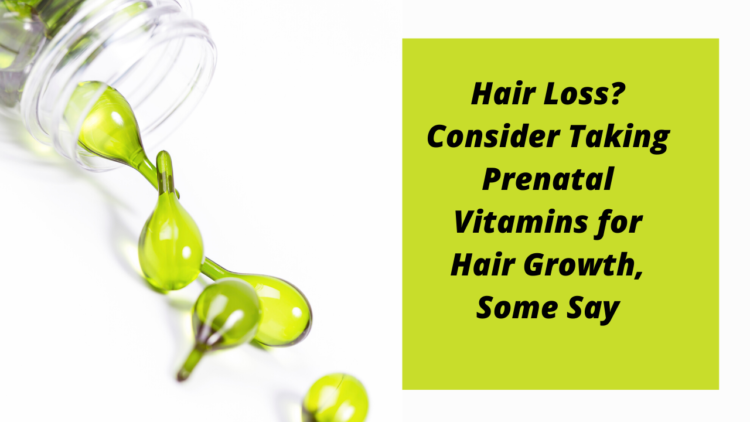Have you heard celebrities talk about the benefits of taking prenatal vitamins for hair growth? The big question is whether or not this is true.
Many women find that their hair does grow exceptionally long during pregnancy, but does that mean that the two are related? Pregnant women also do other things like eat odd food combinations; maybe these are related!
Two Physiological Reasons Why Hair Grows During Pregnancy
The fact is that a woman’s hair grows fast during pregnancy, not because she is taking prenatal vitamins for hair growth, but because of her hormones. The higher levels of estrogen during pregnancy allow the hairs to essentially stay on the head longer before they are shed.
Scientifically speaking, the estrogen-influenced hairs stay in the anagen phase (when they grow) before they progress to the telogen phase where shedding occurs. This results in thicker and longer hair.
Another reason is that the circulation is expanded in the pregnant woman’s body so that the baby can get more nutrients it needs, especially oxygen. Extra blood vessels and capillaries begin to grow and every part of the body including the scalp receives more blood flow. With more blood flow, it’s easy for hair follicles to grow.
It’s a coincidence that the woman is taking prenatal vitamins for hair growth. Or is it?
What About Nutritional Reasons?
Actually, we have to identify what’s in prenatal vitamins for hair growth to see if the nutrients may be part of the reason why a pregnant woman’s hair does grow thicker. Comparing a prenatal vitamin to a regular multivitamin, you won’t find much difference. The average prenatal vitamin formula has more iron and more folate and usually more biotin.
The nutrients cited in medical studies that may be responsible for hair growth include biotin, iron, zinc, iodine, selenium, and vitamin D.
The average prenatal vitamin contains the following amounts of these hair growth nutrients:
• Biotin – 300 mcg
This amount is 100% of the estimated value for adults. A biotin deficiency will cause the hair to fall out. If someone is deficient in biotin, the amounts taken to correct it are 3 mg, 5 mg or even 10 mg. Thus, it’s easy to see that a prenatal isn’t providing a nutritional cushion for those with deficiencies or those with hair loss.
• Iron – 30 mg
This is more than the 18 mg a multivitamin for women would contain for a menstruating woman because the needs are greater in pregnancy, and anemia can seriously harm a developing baby as well as the mother. Iron deficiency causes hair loss.
• Zinc – 15 mg
This is the amount everyone needs as an adult. There’s nothing special with this amount, and it won’t cure a deficiency. Zinc deficiency causes hair loss.
• Iodine – 150 mcg
This amount is 100% of the estimated value for adults. This is an interesting amount to have in a prenatal vitamin since the American Thyroid Association recommends 250 mcg for pregnant and lactating women. Iodine influences thyroid health, which controls how fast the hair, grows. (Birth Defects Res A Clin Mol Teratol, 2012 Sep; 94(9):677-82.)
• Selenium – 100 mcg
The usual amount in supplements is 70 mcg so the 30 mg extra could provide a small buffer, but not enough to be considered a replacement if a woman is deficient. Deficiency is associated with hair loss, as is toxicity. Toxicity is exceptionally rare.
• Vitamin D – 400 IU
Prenatal vitamin companies haven’t caught on to the idea that up to 75% of the population may be deficient in this nutrient, and if so, could need up to 10,000 IU per day for three months in order to correct the deficiency.
Higher circulating levels of vitamin D in moms during pregnancy are associated with improved mental and psychomotor development in infants. (Pediatrics, 2012, Oct; 130(4):e913-20.)
Animal studies are beginning to show an influence of vitamin D on hair growth and regrowth, too, although it’s not definitely proven. However, since vitamin D controls over 1000 different genes that are related to illness, it’s not far-fetched to think that one of those 1000 could possibly be connected with hair growth.
Prenatal Vitamins Can Supplement But Never Be Enough
From this summary, it’s easy to see that prenatal vitamins really aren’t going to do much for hair growth, let alone for pregnancy! Prenatal vitamins are pretty inadequate in providing all the woman’s needs for pregnancy. Surprisingly, prenatal vitamins are one area of medicine not addressed much, as ob-gyns simply hand out prenatal vitamins as if one size fits all.
The problem is that all of us are living far underneath our nutritional potential and have dietary and nutrient imbalances. Nutritional studies have found deficiencies in every group of people, young or old – and it’s not only one deficiency; it’s multiple ones. It’s conceivable that your nutrition can be boosted to optimal and your hair loss could stop.
By adding prenatal vitamins for hair growth, you can temporarily give yourself a boost of some nutrients and notice that you’re feeling better, but there are better ways to approach hair loss that are more scientifically sound. By using a whole panel of nutritional tests and hormonal tests, you can detect the cause of your hair loss.



Comments are closed.